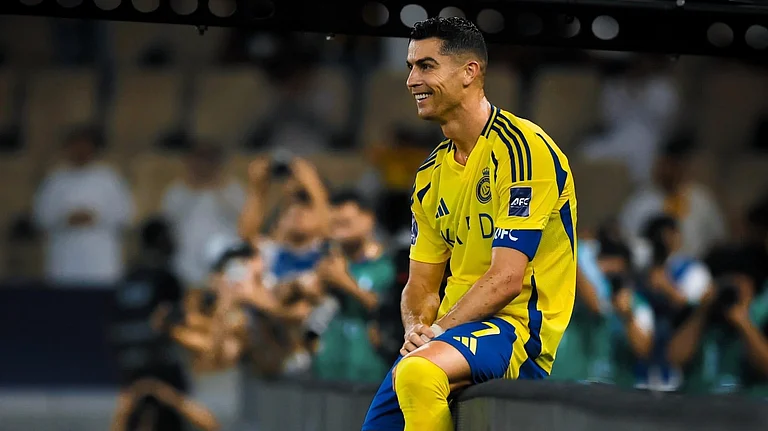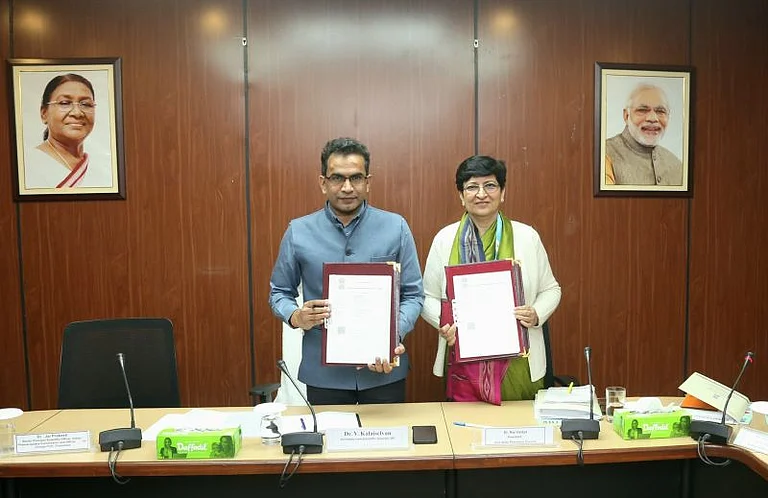In end-February this year, Janata Dal (Secular) supremo H.D. Deve Gowda surprised everybody at the Jain shrine of Shravanabelagola by taking the arduous route to the top of the hill for the mahamastakabhisheka—the grand anointing of the ancient Gomateshwara statue that takes place every 12 years. Three months shy of 85, he made the gritty resolve to tackle the steep climb of 600-odd rock-hewn steps on foot, refusing to be carried up in a doli.
Last Friday, as Gowda celebrated his 85th birthday, his son H.D. Kumaraswamy was fighting tooth and nail to ascend on to the chair of the chief minister—12 years after he assumed that post. Karnataka’s first political family from Haradanahalli village—the H in their initials—was now back at the forefront of the state’s power game, and Gowda, suddenly, once again in the reckoning for the 2019 political equations at the national level.

Gowda’s class 1-4 school in Haradanahalli
In Haradanahalli, a tiny village in the fertile farmlands of south-central Karnataka’s Hassan, 170 km west of Bangalore, he’s a hero: the man who put the region on the map. The mud-walled house that Gowda grew up in no longer exists but locals will eagerly show you the tiny school where he studied, just as they will fill you in with all the details of his political career, great battles and bitter fights. “He has made Hassan and Karnataka proud,” says S. Subbaraya Gowda, a retired schoolmaster and staunch follower. “Has Modi or anyone spoken ill of Deve Gowda?” Sometime in the 1970s, by which time he was already an MLA, Gowda shifted from Haradanahalli to Paduvalahippe, a village across the Hemavathy river where he is still a registered voter. No party campaigned in Paduvalahippe in these elections, according to a recent local news report, because it was pointless to do so.
Of course, winning elections isn’t an easy job, says Suraj Revanna, grandson of Deve Gowda, pointing out that the JD(S) has kept a firm grip on Hassan only because of the work it’s done there. This year too, the party won all but one of the seven assembly seats in the Hassan Lok Sabha constituency that Gowda represents. “So people believe in us; we don’t just make speeches,” he tells Outlook. His grandfather, he says, is a born fighter and the best role model he could have. “He lost elections in 1989, also in 1999. But he never gave up. He’s still coming back and he’s still the same,” he says.

Suraj, 30, a gastroenterologist—three of his cousins too are doctors—is the elder son of Revanna, who has been the legislator of Holenarsipura, the family’s pocket borough in which Haradanahalli is located, since 2004 and a former PWD minister. On May 20, as Bangalore’s political circles were abuzz with Karnataka’s new power equations, a crowd thronged Revanna’s house beside the railway gate at the entrance to Holenarispura town even though the leader wasn’t home. “Anytime, with power or without, our house will be just as crowded,” says Suraj, amid selfies with party supporters. He too is looking to eventually make a career in politics, like brother Prajwal whose apparent disappointment at being passed over for a party ticket in the just-concluded elections drew much attention. Their mother Bhavani Revanna is a zilla panchayat member from the area.
Meanwhile, Kumaraswamy’s wife Anitha is a former MLA who had contested in 2013 as well, but lost. The couple’s son Nikhil is a film actor, having made his debut in 2016 with the Kannada movie Jaguar. It was produced by his father’s company Channambika Films (Kumaraswamy had actually started off as a film distributor and producer).
Gowda’s battles, with the late Ramakrishna Hegde and also G. Puttaswamy Gowda (from Holenarispura) who defeated him twice (in the 1989 assembly polls and the 1999 Lok Sabha elections) are an old saga with which is intertwined the transit from the Janata Dal to the JD(S) of today. Going into assembly elections this year, there was scepticism about whether the JD(S) would be able to repeat its 2013 seat tally of 40, given that it was competing with stronger rivals, the Congress and BJP. Also, several leaders had jumped ship as the polls approached. Besides, the accusation that the party has increasingly become family-centred was only made worse by reports of squabbles within its members over election tickets.
“In my family, there are people who want to contest elections,” Gowda had told Outlook in an interview in April. So, he finally ruled that only sons Revanna and Kumaraswamy would get tickets in the assembly elections. In the event, Kumaraswamy, 59, contested from two seats, Ramanagara and Channapatna (where his wife Anitha had lost in 2013) and won both. Gowda, meanwhile, has indicated that he won’t fight elections again, suggesting that grandson Prajwal might instead contest the Lok Sabha seat at Hassan.

Gowda’s house in Padavulahippe to where he shifted in the ’70s
The 2018 election results show that Gowda’s Vokkaliga community has firmly backed him, just as his party’s moorings since the Janata Party days still linger. “What it basically shows is that the old loyalties to the Janata Dal still remain,” says independent journalist K.S. Dakshina Murthy. “Basically, the JD(S) has managed to win without much effort. So, the goodwill still exists for Gowda.” The veteran, after all, doesn’t have any competition as the tallest leader of the Vokkaligas. Both Gowda and Kumaraswamy, who led the JD(S) campaign, have a very earthy way of relating to people, says Murthy. “They aren’t snobbish and mix easily with everybody. Common people like that approach,” he says.
Kumaraswamy, according to the doting father, is “a very fine boy, but work pressure sometimes make him will lose his cool. I won’t, because of my experience.”
Gowda says he never used a car for 32 years. “I used to move around in government buses. Can I ask the younger generation to do that? Lifestyles have changed,” he had told Outlook earlier this summer. In the middle of a hectic election work schedule at the time, the senior politician pointed to how he was being erratic with his yoga routine. “I will start again in another 15-20 days. I will work hard,” he smiles. “That’s my nature.”
By Ajay Sukumaran in Haradanahalli


























